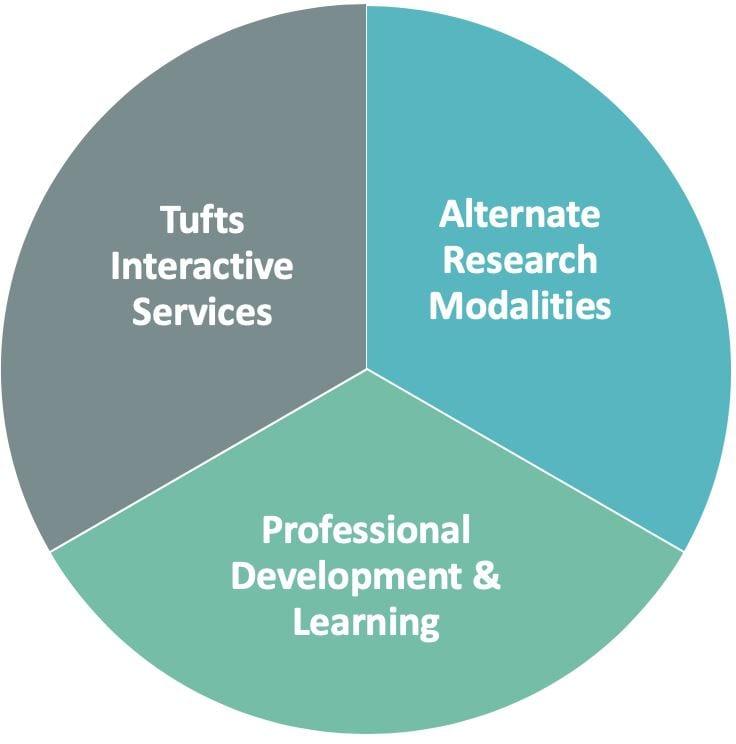Goal Progression & Support (GPS) for Research & Scholarship Programming
The OVPR has compiled a set of resources to assist our research community in maintaining their momentum during the COVID-19 research ramp down period. We’re happy to schedule one-on-one meetings to help select tools and services to best fit your needs. Please contact gps@tufts.edu to schedule an appointment.

Jump to:
Tufts Interactive Services
Interact!
Let us help you find collaborators, mentors, mentees or interest groups at Tufts using Virtual Sandbox. Please fill out this brief SURVEY and we will get back to you. At first, we anticipate connecting individuals in pairs but as our database grows we hope to connect larger groups with shared interests and facilitate interactions with various tools.
Research Continuity
The OVPR Knowledge & Development team can help convert essential content into an online module or micro-learning segment to fulfill key lab-related responsibilities such as onboarding, teaching new techniques, training for new equipment. Contact ovprknowlededevleopment@tufts.edu for more information.
Faculty Information System (FIS)
Tufts Technology Services (TTS) has developed a wonderful new Faculty information System which is a great way to find people at Tufts. Search via key word, name or department.
Tufts CTSI Research Services
Tufts CTSI offers a broad range of research services designed to support and promote collaborative, cross-disciplinary, full-spectrum translational research across its member institutions. Please submit a request via the CTSI website to access services. Selected services include the following:
- Team Science: Through its Research Collaboration Team, Tufts CTSI can help to build and develop research teams to apply for grants. Please submit a request for finding collaborators.
- Research Studios: Grant critiquing services to help junior researchers hone their research proposals
- Research Design & Analysis: The Biostatistics, Epidemiology, and Research Design (BERD) Center offers a range of expertise in study design and data analysis. A full table of services is available (PDF).
- Informatics: The Informatics Program provides services to help identify eligible populations for research, obtain data for retrospective analysis, and collect and manage research data in a secure, HIPAA-compliant environment.
- Recruitment and Retention Support: The Recruitment and Retention Support Unit (RSSU) provides practical, evidence-based recruitment and retention support in pre- and post-award phases of research studies, including helping to ensure recruitment strategies are aligned with population diversity targets.
- One Health: The mission of the One Health Program is to optimize the interrelated health of humans, animals, and the environment. The site includes resources on One Health research, as well as helps researchers identify relevant natural animal research models and matchmaking services to connect collaborators to One Health-related projects.
Alternate Research Modalities
Alternate research modalities may complement your ongoing activities to further your research agenda before and during research ramp-up.
In Silico Experimentation
In silico experimentation involves the computer modeling of a system and then using that model to predict the outcome of a perturbation. When used as a complement to in vitro and in vivo experiments, in silico experimentation can: enhance predictions; refine experimental design; narrow down selection of drug candidates; and, reduce animal usage. Some resources include:
Tools
- BioModels: A repository of mathematical models of biological and biomedical systems. It hosts a vast selection of existing literature-based physiologically and pharmaceutically relevant mechanistic models in standard formats. Our mission is to provide the systems modelling community with reproducible, high-quality, freely-accessible models published in the scientific literature. One recent example involves modelling infection course induced by different influenza strains.
- CellDesignerTM: A modeling tool of biochemical networks with graphical user interface developed by the Systems Biology Institute. Examples of models built with CellDesigner include EGFR, mTOR and TLR signaling, macrophage interactions
- Taverna: An open source workflow management system – a software tool where in silico experiments can be defined and executed.
- AOPERA: A proposed methodology and inventory of effective tools to link chemicals to adverse outcome pathways.
Publications
- From in vivo to in silico biology and back. Di Ventura, B., Lemerle, C., Michalodimitrakis, K. et al. Nature 443, 527–533 (2006). https://doi.org/10.1038/nature05127
- In silico experimental modeling of cancer treatment. Trisilowati, Mallet DG. ISRN Oncol. 2012;2012:828701. https://doi.org/10.5402/2012/828701
- In silico cancer research towards 3R. Jean-Quartier, C., Jeanquartier, F., Jurisica, I. et al.. BMC Cancer 18, 408 (2018). https://doi.org/10.1186/s12885-018-4302-0
- Computational Modeling and Simulation as Enablers for Biological Discovery. National Research Council. 2005. Catalyzing Inquiry at the Interface of Computing and Biology. Washington, DC: The National Academies Press. https://doi.org/10.17226/11480.
- In Silico Plant Biology Comes of Age. Nancy A. Eckardt, Malcolm Bennett. The Plant Cell Oct 2012, 24 (10) 3857-3858; https://doi.org/10.1105/tpc.112.241011
- A compilation of publications papers related to in silico experimentation from ScienceDirect
Analyzing existing databases/datasets
Many excellent databases exist for varies demographic, disease and exposure endpoints:
- Government data
- University of Missouri Libraries has compiled an extensive list of resources. A librarian is available via chat on the website for assistance.
Survey-Based Research
Survey based research is a staple for many researchers and is particularly amendable to being conducting remotely.Here is a list of publications that may be helpful:
- Understanding and Evaluating Survey Research. Ponto J. J Adv Pract Oncol. 2015 Mar-Apr;6(2):168-71. Epub 2015 Mar 1. https://www.ncbi.nlm.nih.gov/pmc/articles/PMC4601897/
- Good practice in the conduct and reporting of survey research. KATE KELLEY, BELINDA CLARK, VIVIENNE BROWN, JOHN SITZIA. International Journal for Quality in Health Care, Volume 15, Issue 3, May 2003, Pages 261–266, https://doi.org/10.1093/intqhc/mzg031
- Survey research. Visser, P. S., Krosnick, J. A., & Lavrakas, P. J. (2000). In H. T. Reis & C. M. Judd (Eds.), Handbook of research methods in social and personality psychology (p. 223–252). Cambridge University Press. https://web.stanford.edu/dept/communication/faculty/krosnick/Survey_Research.pdf
Conducting Online Interviews and Focus Groups
Sara C. Folta discusses techniques for conducting focus group and interview research in an online format. Click here to access the online course.
Professional Development & Learning
Resource Topic Areas:


NIH-NIGMS
The National Institute of General Medical Sciences has compiled and extensive set of resources for learning and mentorship from NIH, NSF and others. A great resource for investigators of all levels but particularly for graduate students and post-docs.

IEEE Xplore
Tufts has a license to IEEE Xplore. This digital library is a powerful resource for discovery of scientific and technical content published by the IEEE (Institute of Electrical and Electronics Engineers) and its publishing partners. IEEE Xplore provides web access to more than five-million full-text documents from: 195+ journals 1,900+ annual conferences; 9,000+ technical standards; Approximately 2,400 books; 485+ educational courses. Note: This needs to be accessed via the Tufts network (eg by VPN).

Grant and Writing Support
The OVPR Research Development has resources for:
- Online grant writing workshops and support, including finding funding (graduate students and postdocs), grantsmanship strategies and best practices (all levels), and other grant-related topics by request.
- Faculty writing groups focused on proposal development, where small groups of researchers in similar fields (including biomedical, STEM, social sciences, arts, and humanities) can meet virtually, set writing goals, and receive feedback from peers and research development professionals.
Please contact researchdevelopment@tufts.edu for more information.
Tufts CTSI
Tufts CTSI’s I LEARN includes online training and scientific talk archives, including videos on analysis, research ethics, developing and writing research questions, aims, and hypotheses, among other popular topics relevant to basic, clinical, and translational research.
CITI Training for Human Subjects / Clinical Research
Researchers involved in or considering research involving human subjects are required to take certain courses through the CITI training program, and additional research-related courses on various aspects of responsible conduct of research are available.
The Office for Human Research Protections has videos on various topics related to research involving human subjects, including information about IRBs.
The Office of Research Integrity has many resources on the responsible conduct of research, including interactive movies, case studies, resources for those working with animals in research and others. Click on the RCR Resources tab at the top of the page to access these resources.
Tufts Learning Center
Tufts Learning Center offers access to hundreds of professional development courses and compliance training programs from the Office of the Vice Provost for Research as well as TTS, HR, and HR Wellness. Investigators can find resources from Research Development on finding funding and from OVPR Compliance on maintaining training compliance during the Research Continuity phase and beyond. For an overview, see the OVPR Training site.
MIT Open Course Ware
MIT Open Course Ware (OCW) is a web-based publication of virtually all MIT course content. OCW is open and available to the world and is a permanent MIT activity.
Harvard Online Courses
Harvard University currently has 57 free courses available with many other paid options.
LinkedIn Learning
All Tufts employees and students have access to LinkedIn Learning (previously known as Lynda.com) – there are lots of multi-hour ‘courses’ you can take for free, like how to code in Python, how to become and expert at Illustrator/Photoshop, statistics, etc.